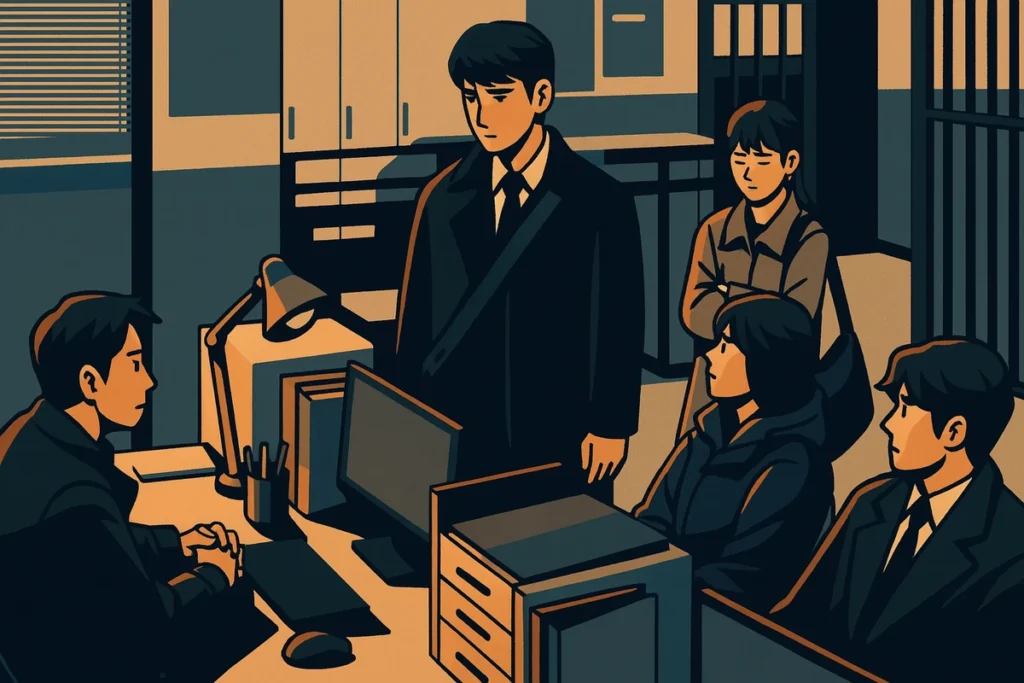[Image Source] AI illustration by DALL·E
TL;DR – How to survive when you're "invisible."
In Korean office culture, silence is power—and survival. This scene, where Mi-ji pretends to be her twin Mi-rae, showcases the subtle yet brutal expectations of workplace behavior: don’t react, don’t exist unless needed.
From lines like "넌 보이지 않는 사람이야" to passive-aggressive commands, the dialogue reveals a cultural script of obedience, emotion suppression, and weaponized politeness.
It’s a masterclass for learners in both real-life expressions and deeper cultural context.

1. Scene Snapshot
In a fluorescent-lit office, cold glances fly back and forth. One person stands out awkwardly—Mi-ji, filling in for her sister Mi-rae. She tries to follow the unspoken rules: stay quiet, don’t react, sit where told. But her stiff movements give her away. Calm Mi-rae tells her, “Act like you’re not here.” This moment captures the Korean workplace survival code—watching for cues, respecting hierarchy, and hiding your feelings.
📺 Watch the original scene here
[Source] YouTube @tvNDRAMA_official
2. Micro-Dialogue
아마 자리 없을 거야. 저 구석 의자에 앉아.
There’s probably no seat. Take the chair in the corner.
커피 나왔습니다.
Your coffee is ready.
잊지 마. 여기선 없는 사람처럼 있어.
Don’t forget. Here, you’re invisible.
기분 상해도 절대 반응하지 마.
Even if you feel annoyed, don’t react.
난 괜찮으니까, 유선임 드시라고 해. 며칠 쉬셨다고 깜빡한 거 아냐? 얼른 드세요.
I’m fine—tell Senior Yoo to have it. Did you forget hers since she was out? Please, drink.
3. Culture & Subtext
3-1. “없는 사람처럼 있어” – The Pain of Being Erased
Mi-rae tells Mi-ji, “없는 사람처럼 있어” (“Act as if you’re not there”). But this line isn’t about being a woman or a junior—it’s about a specific survival tactic in an already hostile environment. Mi-ji is stepping into Mi-rae’s world, where others are erasing Mi-rae herself. She’s not respected, she’s not heard—so for Mi-ji to play the part, she too must become invisible. This isn’t fictional exaggeration. It’s a mirror of how some people—especially those being ostracized—must learn to suppress their reactions to avoid further isolation.
3-2. “유선임 드시라고 해” – Politeness as a Weapon
The co-worker doesn’t shout or insult Mi-ji. Instead, she uses layered sarcasm and fake politeness. Saying “유선임 드시라고 해” and “깜박한 거 아니야?” seems kind, but it’s a social weapon—forcing Mi-ji to accept blame in front of others without directly confronting her.
3-3. “절대 반응하지 마” – Obedience Under Surveillance
By making Mi-ji “take the fall,” Mi-rae isn’t just being cold. She’s navigating survival in a hostile office. Mi-ji’s silence buys Mi-rae credibility and safety, but also shows how language and hierarchy trap people into roles—even sisters.
❓ FAQ (Frequently Asked Questions)
Q1. Why does “없는 사람처럼” feel so emotionally heavy?
→ In Korean, saying someone is “invisible” isn’t just poetic—it’s a form of social erasure. It implies that you must suppress your presence, reactions, and even emotions. Reddit users often interpret this as an extreme coping tactic in rigid environments like schools or offices. It’s about survival, not invisibility.
Q2. Why are characters polite when being mean? Isn’t that confusing?
→ Koreans use honorific speech (존댓말) not only for respect, but also for sarcasm and emotional control. When someone says something harsh in polite language, it can sound colder and more cutting. On Quora, many learners say formal insults feel worse than casual swearing because of their passive-aggressive undertone.
Q3. What does “유선임 드시라고 해” really imply?
→ It sounds polite on the surface: “Tell Senior Yoo to drink it.” But in context, it’s a loaded phrase. The speaker implies Mi-ji forgot the coffee, blames her in front of others, and does so with exaggerated formality. This is a common workplace tactic to shift blame without raising one’s voice.
Q4. Why do Korean characters keep saying “절대 반응하지 마” (don’t react)?
→ This reflects a broader cultural value: enduring discomfort in silence. Especially in hierarchical settings like offices, reacting can be seen as disrespectful. So phrases like “don’t react no matter what” are about preserving harmony and status—even at personal emotional cost.
Q5. Is this kind of behavior common in real Korean workplaces?
→ Not always, but it’s recognizable to many Koreans. Drama scenes often exaggerate for effect, but the emotional dynamics—like seniority, indirect blame, and polite tension—are very real. Reddit threads frequently describe similar “office survival” strategies used in high-pressure Korean companies.
4. Grammar in Action
Sentence 1
아마 자리 없을 거야. 구석에 의자 있으니까 거기 앉으면 돼.
🔍 Analysis
– 아마: “probably, maybe” – expresses assumption.
– 자리 없을 거야: 자리 (seat) + 없다 (to not exist) + future assumption ending “-을 거야” → “will probably not exist.”
– 구석에: 구석 (corner) + locative particle “-에” (in/at).
– 의자 있으니까: 있다 (to exist) + causal connective “-으니까” (because).
– 앉으면 돼: 앉다 (to sit) + conditional “-으면” (if) + 되다 (it’s fine to / you can) + connective ending “-어” → “돼”
📌 Example Usage
밖엔 자리가 없어. 안에 테이블 있으니까 거기 앉으면 돼.
“There’s no seat outside. There’s a table inside, so sit there.”
☀️ Meaning
Seats are probably taken, so use the one in the corner.
🧩 Similar Patterns
– 창가 쪽에 자리 있으니까 거기 앉아. → “There’s a seat by the window, so take it.”
– 시끄러우니까 안쪽으로 들어와 앉아. → “It’s noisy here, so move inside.”
💬 Usage & Variation
– Polite: “구석 쪽에 자리 있으니 앉으세요.” (Please take the seat in the corner.)
– Casual: “구석에 앉으면 돼.” (Sit in the corner.)
Sentence 2
커피 나왔습니다.
🔍 Analysis
– 커피: Loanword “coffee.”
– 나왔습니다: 나오다 (to come out) + past tense “-았-” + formal polite ending “-습니다.” Used when an order is prepared.
📌 Example Usage
주문하신 커피 나왔습니다.
“Here’s the coffee you ordered.”
☀️ Meaning
A formal way to announce that a drink or food order is ready.
🧩 Similar Patterns
– 음식 나왔습니다. → “Your food is ready.”
– 준비되었습니다. → “It’s prepared.”
💬 Usage & Variation
– Casual: “커피 나왔어요.” (Your coffee’s ready.)
– Softer: “커피 준비됐습니다.” (Your coffee is prepared.)
Sentence 3
잊지 마. 여기선 없는 사람처럼 있어.
🔍 Analysis
– 잊지 마: 잊다 (to forget) + prohibition “-지 마” (don’t).
– 여기선: 여기 (here) + 에서 (location) + topic particle -는 → contracted to “여기선.”
– 없는 사람처럼: 없다 (to not exist) + attributive ending “-는” (present tense) + 사람 (person) + 처럼 (like/as if).
– 있어: 있다 (to stay/be) in casual form.
📌 Example Usage
회의 중에는 없는 사람처럼 조용히 있어.
“During the meeting, act like you’re not here.”
☀️ Meaning
Stay invisible unless directly addressed—this is self-erasure for survival in certain settings.
🧩 Similar Patterns
– 나 부를 때만 얘기해. → “Speak only when I call you.”
– 없는 듯이 조용히 있어. → “Stay quiet as if you’re not here.”
💬 Usage & Variation
– Softer: “조용히 있으면 좋겠어.” (It’d be good if you stay quiet.)
– Stronger: “여기선 없는 셈 치고 있어.” (Pretend you’re not here.)
Sentence 4
거슬려도 절대 반응하지 마.
🔍 Analysis
– 거슬려도: 거슬리다 (to be irritating) + concessive “-아/어도” (even if).
– 절대: absolutely / never — strong negation.
– 반응하지 마: 반응하다 (to react) + prohibition “-지 마” (don’t).
📌 Example Usage
기분 나빠도 절대 말대꾸하지 마.
“Even if you feel bad, never talk back.”
☀️ Meaning
No matter what, do not respond—used to maintain composure or avoid escalation.
🧩 Similar Patterns
– 화나도 표정 바꾸지 마. → “Even if you’re angry, don’t change your expression.”
– 속상해도 말하지 마. → “Even if you’re upset, don’t say anything.”
💬 Usage & Variation
– Formal: “절대 대응하지 마십시오.” (Do not respond at all.)
– Casual: “아무리 그래도 참아.” (Hold it in, no matter what.)
Sentence 5
난 괜찮으니까, 유선임 드시라고 해. 며칠 쉬셨다고 깜빡한 거 아냐? 어서 드세요.
🔍 Analysis
– 난 괜찮으니까: 나 (I) + topic particle -는 (난) + 괜찮다 (be fine) + causal “-으니까” (because).
– 유선임 드시라고 해: 유선임 (Senior Yoo) + 마시다 (to drink) → honorific 드시다 + indirect command “-라고 하다” (tell to) + “아/어” (sentence ending)
– 며칠 쉬셨다고: 며칠 (a few days) + 쉬다 (to rest) + honorific past “-셨-” + indirect quote “-다고.”
– 깜빡한 거 아냐?: 깜빡하다 (to forget) + past modifier -은 + 것(→ 거) + negative rhetorical “아냐?” (isn’t it?).
– 어서 드세요: 어서 (please/hurry) + honorific polite imperative “드세요.”
📌 Example Usage
나는 됐으니까, 저 분 드시라고 전해 주세요.
“I’m fine, so please tell that person to drink it.”
☀️ Meaning
Polite on the surface, but could be a subtle way to highlight someone’s oversight.
🧩 Similar Patterns
– 내 건 됐으니까, 대신 드려. → “I’m fine, give it to them instead.”
– 그분 드시라고 해. → “Tell them to drink it.”
💬 Usage & Variation
– Formal: “저는 괜찮으니, 선생님께 드리십시오.” (I’m fine, please give it to the teacher.)
– Casual: “난 됐으니까, 그분 줘.” (I’m fine, give it to them.)
5. Natural Korean Toolkit
미안
Sorry
Alternative Expressions: 미안해, 죄송
“미안” is raw, short, and casual—used when you feel guilty or flustered among close peers. Compared to “죄송합니다,” it sounds more vulnerable or rushed.
됐어
It’s fine / Forget it
Alternative Expressions: 그만해, 신경 꺼
This can dismiss someone’s apology or attempt to help. In tense moments, it signals emotional overload or an unwillingness to continue talking.
어이없어
That’s ridiculous / I can’t believe this
Alternative Expressions: 헐, 진짜?
Used when someone’s logic or behavior is baffling. A common reaction is when rules or norms feel unfair.
어색해
This is awkward
Alternative Expressions: 민망해, 뻘쭘해
Said when the social vibe is off. It captures discomfort from silence, misunderstandings, or role confusion.
마셔
Drink up
Alternative Expressions: 마시라니까, 드세요
Direct and often repetitive in scenes where there’s social pressure to comply. The tone changes depending on who’s saying it—gentle or aggressive.
6. Quick Quiz or Expression Drill
Fill in the blank
1) 잊지 ___!
2) ___ 반응하지 마.
3) 자리 없을 거야. ___에 앉아.
4) 난 됐으니까, 유선임 ___ 해.
5) 며칠 쉬셨다고 ___ 한 거 아냐?
Multiple choice
6) Told not to react despite annoyance:
a) 어색해
b) 마셔
c) 절대 반응하지 마
7) Snappy “It’s fine” in Korean:
a) 됐어
b) 어이없어
c) 미안
8) Pretending not to exist in a group:
a) 자리 없을 거야
b) 없는 사람처럼
c) 깜박했나 보구나
🎥 Want more about this drama’s language and themes?
Explore more posts in our K-Drama Bites series and learn how Korean drama lines reveal everyday emotion, grammar, and cultural nuance.
- 🔖 Learn Legal Korean from K-Drama: What “I Won’t Withdraw” Really Means in ‘Our Unwritten Seoul’
- 🔖 Learn Korean with an Ordinary Scene from Our Unwritten Seoul
- 🔖 Learn Korean with a Morning Panic Scene from ‘Our Unwritten Seoul’
- 🔖 Learn Korean with a Public Confrontation: Mistaken Identity and Sarcasm in “Our Unwritten Seoul”
- 🔖 Twin Identity & Korean Phrases: Language Lessons from Our Unwritten Seoul Shorts
Answers
1) 마
2) 절대
3) 구석
4) 드시라고
5) 깜박
6) c) 절대 반응하지 마
7) a) 됐어
8) b) 넌 투명인간이야


